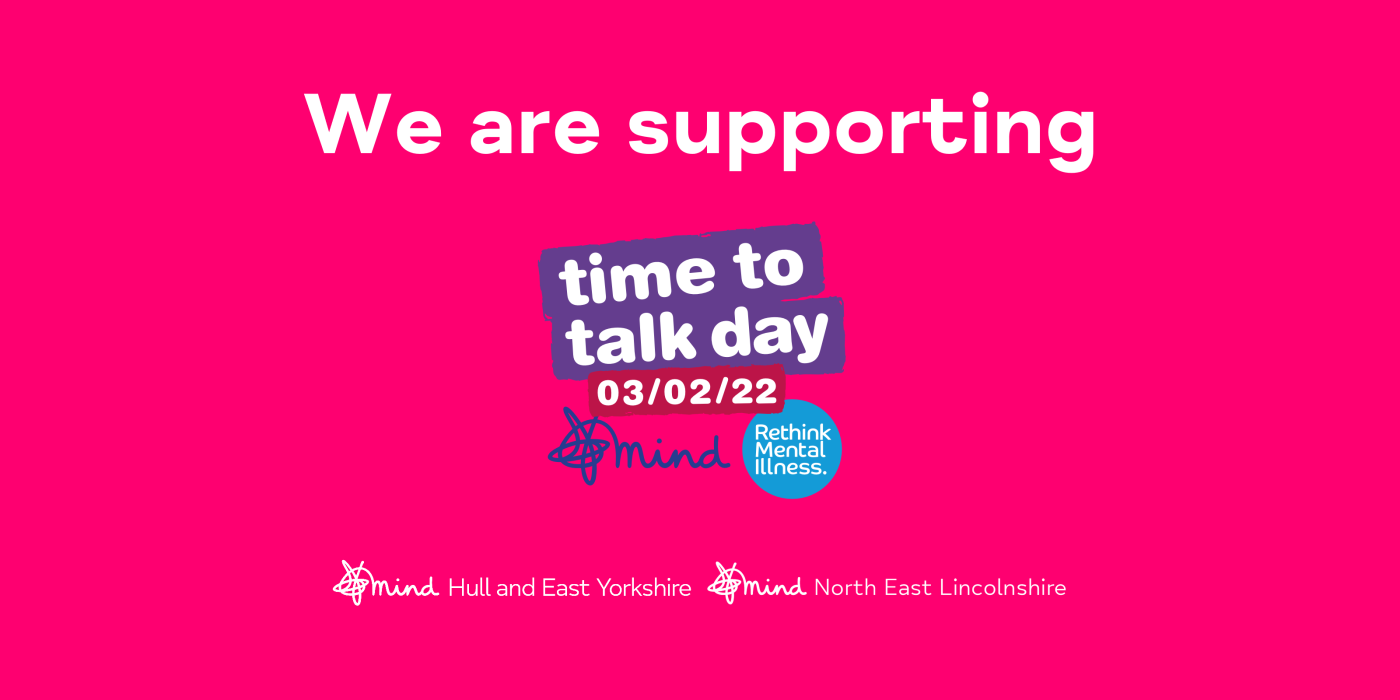We wanted to share some hints on tips for Time to Talk Day on how Hull and East Yorkshire Mind’s members of staff start those all-important conversations about mental health. Here are some top tips:
Emma, our Development Worker and Coordinator within the East Riding said:
I start a conversation non- verbally before saying anything, think how you would like to be treat or spoken to, use good eye contact and an approachable manner. Smile, sit relaxed and be open.
Then introduce yourself or if it’s someone you know maybe ask, “So how are things been for you?” “Tell me how your week has been?” “Tell me how you’re feeling.”
I love the TED words (Tell, explain or describe). They’re easy to remember and really work, so much better then closed questions such as “Are you ok?”
Moreover, be human, genuine and be you. Listen. Really listening is an art in itself, you might not need to say much and just by showing you’re there in the present moment and listening is key in gaining trust.
Then you can explore a little more, don’t be afraid, be open about mental health, and always ask twice – this has always worked for me.
If you’re unsure, give it a go!
Dan, Director of Development for Hull and East Yorkshire Mind, said:
Having been on both sides of this, my advice is just to start. You’ll be surprised how easy it can be and also been asked the question can quite often be a big relief and just what someone was waiting for.
Don’t over think it, don’t worry about saying the right or wrong thing, the best thing to do is just to speak and be prepared to listen.
In training we talk about asking the question twice, just to make sure.
Be you. If you think you need to ask someone how they are, that implies you are a caring person, so just let that care out.
And I can’t stress enough, be prepared to listen. Create time and space for that to happen. No phone or email checking, be totally present and there for the person.
Speak to the person in a way that is comfortable and familiar for them, don’t suddenly change how you phrase things or the words you use.
Just be you.
The more we talk about things the more open we become.
Charlotte, our Crisis Interventions Service Coordinator for Hull and East Yorkshire Mind, said:
Some phrases I use are:
“How are you doing?” – And always ask twice!
“Tell me how you’ve been recently?”
“How have you been feeling?”
“I’ve noticed you haven’t been yourself recently and I want to support you however you feel best, what’s going on?”
“I’m here for you and want to listen, please talk to me. If not me, I can support you to find the right person to talk to.”
Lorraine, Head of Training said:
I’m a trainer with Hull and East Yorkshire and North East Lincolnshire Mind and I always say to people on the courses that I think we’re pretty good at noticing when something has changed for someone and they seem different to how they usually are. However taking that next step of asking them can be daunting and it doesn’t have to be. Keep it simple and direct and tell them what you’ve noticed. For example “I’ve noticed you’ve been really quiet on the team meetings lately. Is there anything you’d like to talk about?”
Always think about how and where you are going to approach them and make sure you get rid of any distractions such as you’re phone, emails etc. Allow enough time to listen to them. Make sure you can talk in private.
Once the person starts to talk to you about what’s going on for them make sure you’re listening fully and not butting in. Try to show empathy and not sympathy. We always want to put a positive spin on things but it’s more helpful for a person when they are experiencing some mental health issues to just listen to how they are feeling in a non-judgmental way. Put yourself in their shoes. That way they will feel heard and get the message that you’re taking them seriously.
Before you have the conversation think about having some idea of where they could perhaps get some advice and guidance, such as our 24/7 information service or the website. Resources on the MHFA England website are useful too, such as their Take 10 Toolkit for mental health conversations which can be accessed at mhfaengland.org/mhfa-centre/resources/
If you are interested in finding out about the training we deliver to raise awareness of mental health issues and how we can support your organisation contact us on [email protected] or visit www.heymind.org.uk/how-we-can-help/training-and-consultancy/
If you are wanting information or advice, our Information Service is open 24-hours-per-day, 7-days-a-week to support you, your friends, family members or colleagues. Call us on 01482 240133, email [email protected], or text 07520 633447.




